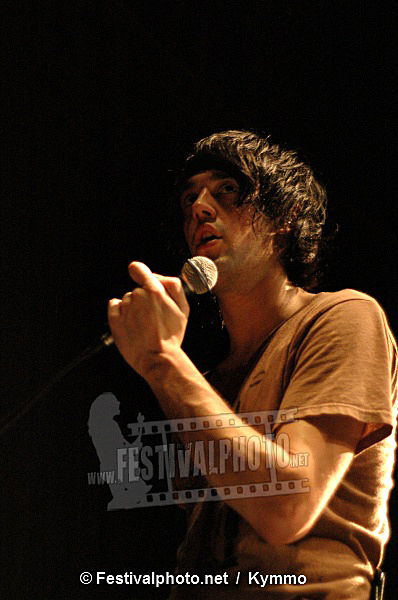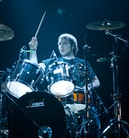| Klaxons When faced with a vast and unknown gulf, the most standard response is to find a path to circumvent it. A very basic and understandable impulse exists to avoid that obstacle – unless of course, you are Klaxons. When you’re less a band and more a sonic Socratic method wrapped in hard-driving guitars and anthemic melodies, the gulf is embraced, and the void is ultimately surfed. The path to Klaxons’ sophomore release Surfing the Void was rife with hard-won clarity and false starts. After the success of 2007’s Myths of the Near Future, the London-based quartet were poised for stateside domination. With a Mercury Prize under their belt and pop credentials like a stage shared with Rihanna, the band prepared to bridge the Atlantic and unleash another wallop of existentialism set to arm-flailing beats and shimmering synths. It was at this point that the band found themselves on the precipice of a vacuum that would keep them paralyzed for roughly a year. The band with countless ideas, a veritable library of literary references and an arsenal of hooks couldn’t figure out what to say. “We ticked off all the boxes in terms of second album clichés,” says keyboardist and co-vocalist James Righton. “Going to studios without songs written – we went to Milan for four weeks, and we hadn’t got a single song written.” Still, each misstep was a type of progress, a bone broken to reset properly. A particular low point came after a show where the band attempted to play what originally would have been the second album. “We tried out the more cerebral, considered songs that we’d been writing, and it just didn’t feel right at all.” Still, Klaxons moved further into the vacuum, rather than retreat. “There’s a lot of chemistry between us,” explains Righton. “It’s a case of all the factors being right before it works.” One of those factors came in the form of producer Ross Robinson (At the Drive-In, Blood Brothers). “He is the most meaningful coincidence that ever happened,” explains bassist and co-vocalist Jamie Reynolds of Robinson’s introduction to the band. Just as the band continued to dispense with one producer after another, floundering musically, Robinson’s manager called Klaxons to see whether they might be in need of a producer. Robinson flew to London, and transformed a ninety-minute meeting in a pub into a deeply honest emotional excavation. “He dealt with each of us as an individual, to make sure that everyone brought to the surface exactly what it was that was going on in their personal lives.” Another factor in the mix was lyricist Reynolds’ realization that he already possessed the contents of the record; he simply needed to write it. “I searched for a good three or four months about what I should be writing about. At one point, I discovered I didn’t need to look – I already knew. I had gone on this big search; I looked everywhere. I got to the pinnacle, and the answer came that I didn’t need to look anymore.” “We were thinking way too much about music,” explains Righton. “When we switched off our brains, it all came together.” From there, the cultural, emotional and musical void was forded quickly. The band first decamped to the isolation of a Welsh dingle, then out to Venice Beach to the house where they would live and record for several months. There, with the help of Robinson, the band burnished Surfing the Void’s songs in what Robinson called “the fire”: a form of critical mass, the notion that each member is playing to their capacity, so much so that at any moment, everything might fall apart. The resulting album is an exploration of the esoteric matters that have long consumed the band. “Twin Flames” explores the Platonic idea that each person has a perfect other half floating somewhere in the universe. Anchored by clipped drums and buoyed by otherworldly, reverbed synths, the instrumentation reflects the congress of two halves. Kicked off by a piece of garbled in-studio dialogue that sounds like a lost transmission, “Flashover” describes the arrival of extraterrestrial life forms, a Klaxonian foregone conclusion. Continuing on that theme, “Echoes” laces melodic imaginings of the blurring of worlds over a punishingly-paced guitar line. The album’s mission statement, “Surfing the Void” distills down both the band’s perception of the larger cultural void and the one that existed within themselves before arriving at the perfect alchemy of thought and action. In doing so, the band found it wasn’t a void at all but an opportunity. In embracing the presence of the absence, an entirely new landscape was mapped. http://www.klaxons.net Record Label: RINSE 
|
||
Bevakade spelningar: 2013-07-20 Klaxons (Marés Vivas 2013) 2010-12-30 Klaxons (The Falls (Lorne) 2011) 2010-08-14 Klaxons (Dockville 2010) 2009-09-12 Klaxons (Bestival 2009) 2009-08-15 Klaxons (Sziget 2009) 2007-03-06 Klaxons (Ninkasi Kao - Lyon) |
||
|
|
||









